Sep, 16 2024 – North American West Coast Lecture Tour (3) San Jose
Hello. Today is the day of Venerable Pomnyun Sunim’s third lecture during his North American West Coast tour, taking place in San Jose, the largest city in the Silicon Valley region.
After completing his morning practice and meditation, Sunim left the Seattle Jungto Retreat Center at 4:50 AM and departed for the airport.
Sunim took a commemorative photo with Dharma Teacher Myomyeong and the Seattle Jungto Society members who saw him off at the airport. He expressed his gratitude, and then headed to the boarding gate.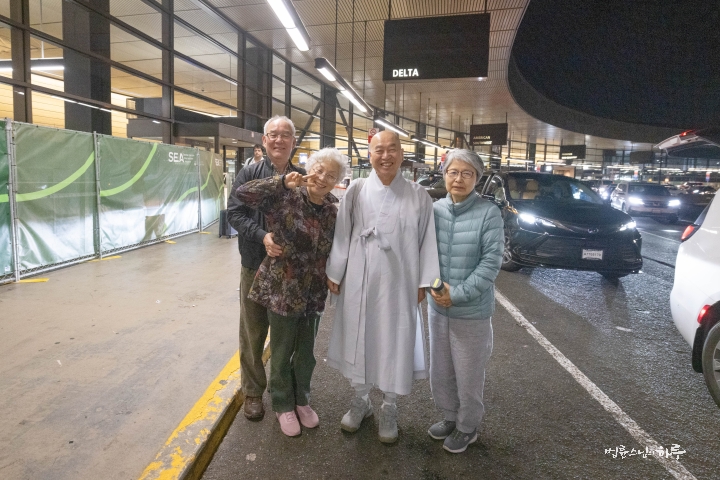
The plane that departed from Seattle Airport at 7:30 AM arrived at San Jose Airport at 9:50 AM after a 2-hour and 20-minute flight.
As Sunim came out of the airport exit, San Jose Jungto Society members welcomed him with bouquets of flowers.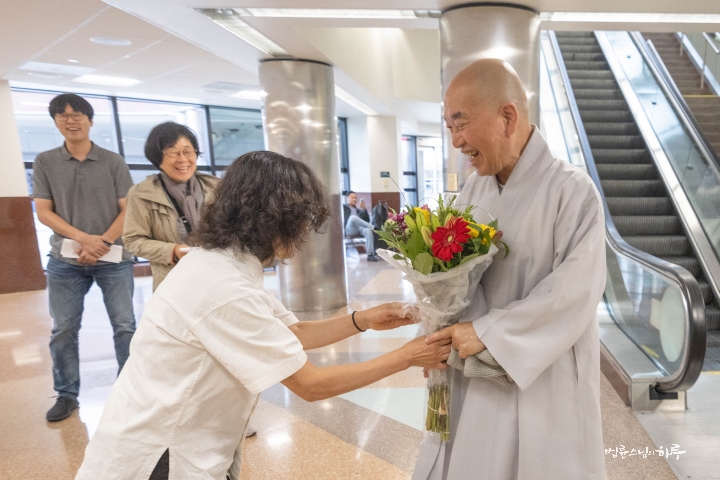
“Welcome to San Jose, Sunim.”
After taking a commemorative photo together, he moved to today’s accommodation at Ms. Kim Jun-ja’s house.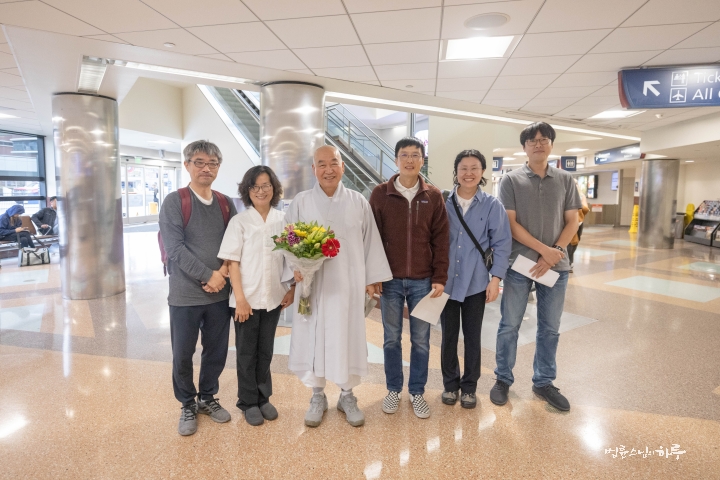

After lunch, Sunim immediately moved to Santa Clara for an invited lecture. A few days ago, upon hearing that Sunim was coming to Silicon Valley, ST Microelectronics, an IT company headquartered in this area, requested a lecture.

After a 30-minute drive, he arrived at the company’s headquarters building and waited briefly before going to the lobby on the first floor. About 40 employees from nearby IT companies were waiting for Sunim. The invited lecture began at 2:00 PM sharp.
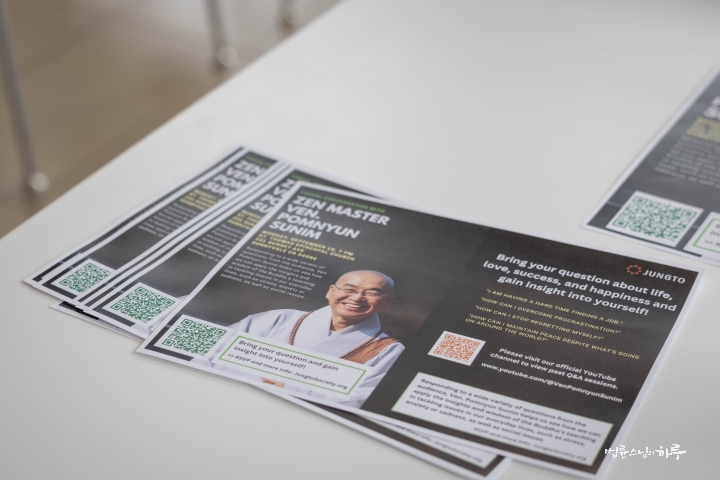
Sunim gave a light greeting and introduced the purpose of the Dharma Q&A.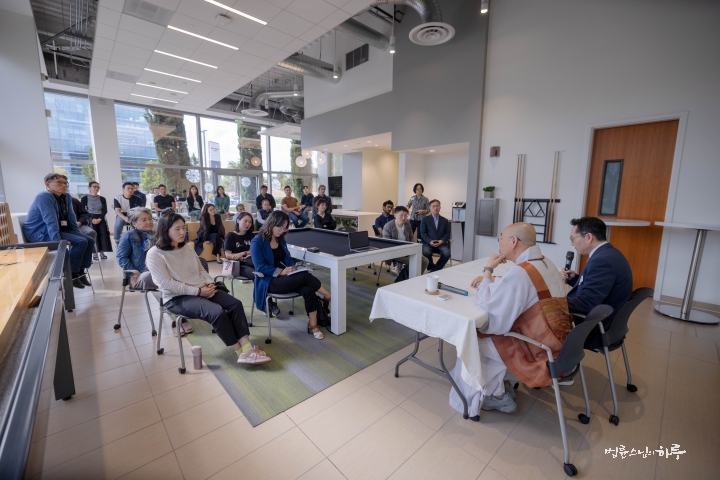
“It’s nice to meet you. This lecture wasn’t originally planned, but when they heard that I would be giving a lecture in San Jose at 7 PM today, your company requested this lecture, and it was suddenly arranged. Thank you for participating despite the sudden arrangement.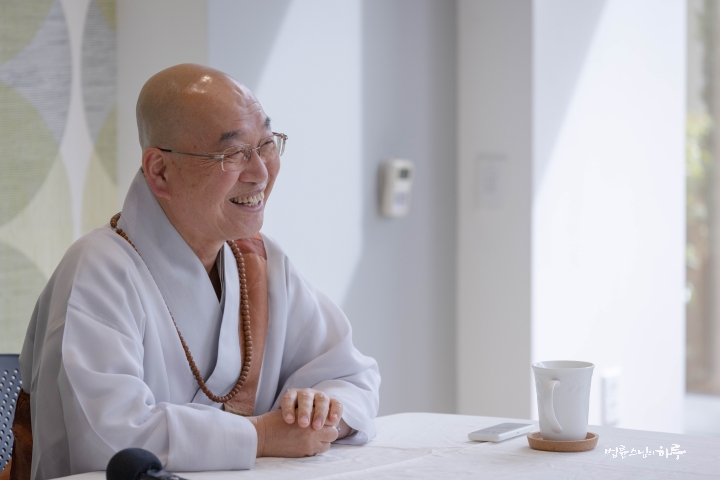
I mainly play the role of counseling people’s difficulties. When people have questions or sufferings in life, I have conversations to unravel the threads of their anguish. A Dharma Talk is not about speaking Buddhist doctrines or knowledge. It’s when our suffering disappears through talking about the stress or anguish we’re experiencing at the moment. That’s what we call a Dharma Q&A. The goal of a Dharma Talk is to reach a state free from suffering. The Buddha also conversed with many people, guiding them to reach a state where their suffering was resolved through dialogue when they had questions or sufferings. Please speak as comfortably as you would to a friend.
I also do work helping people in need. This work seems to follow Jesus’ teachings more than the Buddha’s. Because in Matthew 25, Jesus said, ‘Whatever you did for one of the least of these brothers and sisters of mine, you did for me.’ And he mentioned six types of people as being the same as himself. These are the thirsty, the hungry, the sick, the naked, the stranger, and the prisoner. Giving water, food, medicine, clothes, welcoming, and visiting these people is the same as helping Jesus. In modern terms, it can be described as providing humanitarian aid to those struggling for survival.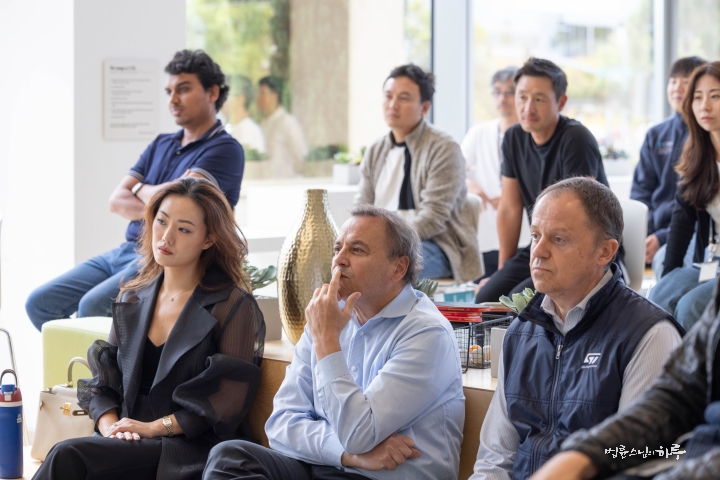
When I help people with mental anguish, they often express great gratitude and want to repay me by making donations. I use most of that money to support people who can’t even maintain a basic standard of living. As a result, I do a lot of humanitarian aid work for people in need in poor countries. You probably mostly have mental anguish. Let’s have a light conversation about whatever difficulties you have.”
Then, anyone could raise their hand and ask Sunim questions and have a conversation. For an hour and 20 minutes, three people asked Sunim questions. One of them said that working in a competitive society often makes them anxious and asked for Sunim’s advice on how to manage their mind in the workplace.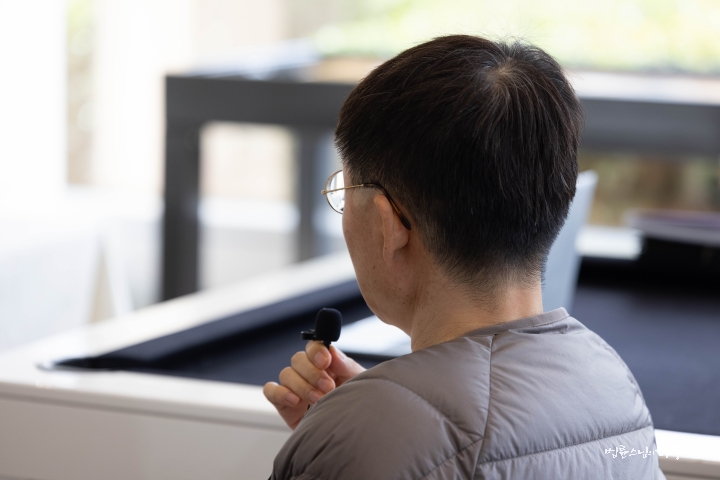
When Competition Is Fierce, We Often Feel Anxious
“There can’t be only good things in the world. If you borrow money, you have to pay it back with interest. If you eat delicious food, you’re bound to gain weight. If you want to be slim, you have to endure some hunger. This is the way of the world. Everything comes with a price and consequences. But now, you are trying to avoid paying that price. If you don’t want to pay interest, don’t borrow money, and if you’ve borrowed money, you should plan to pay it back with interest without fail. You shouldn’t think it’s unfair. If you want to eat delicious food, you have to accept weight gain, and if you want to prevent weight gain, you have to resist even when you want to eat.
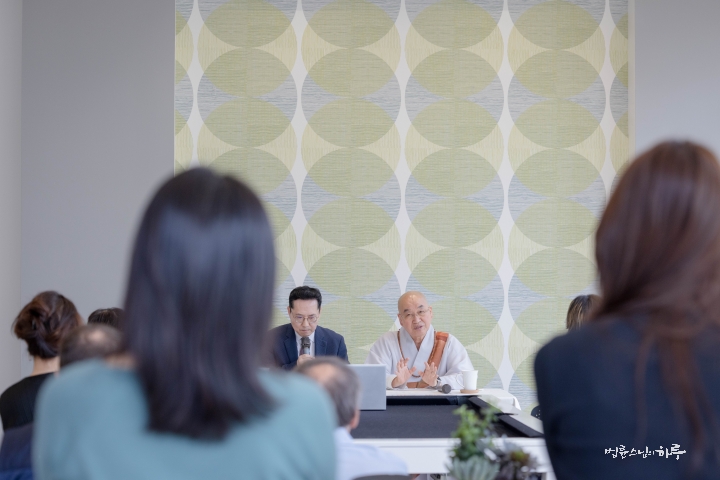
But why do we get stressed? We get stressed because we want to eat as much as we want without gaining weight. We suffer because we think in ways that don’t make sense. We suffer because we look for ways not to repay money we’ve borrowed. That’s why you like things like ‘If you believe in God or Buddha, you don’t have to pay it back.’
If living a competitive life is hard, you can quit. If you’ve entered into competition, then compete. You get stressed when you lose because you’re attached to the idea that you must win. When you play soccer on a field, someone is bound to win and someone is bound to lose. But exercising for health has nothing to do with winning or losing. Whether you lose or win, you still get exercise. But if money is involved, there’s a big difference between winning and losing.
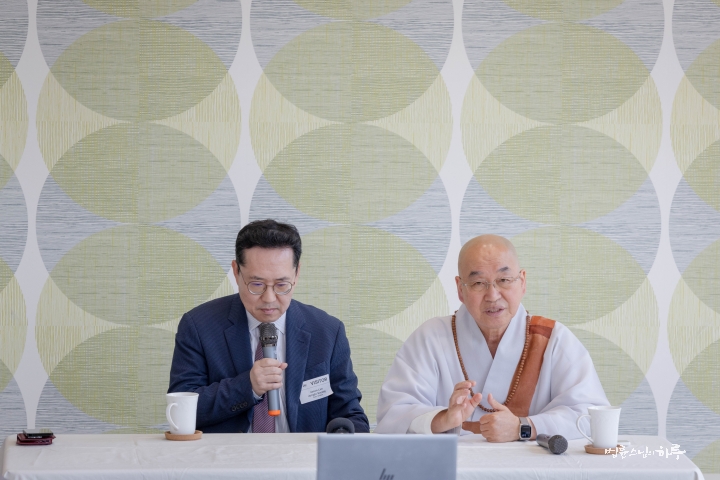
So I think it might be good to try competing as practice. In a competitive game, someone might lose, and someone might win, right? There’s no need to become enemies just because you won or lost. I’d like you to live your life as if you’re practicing some sport. In other words, it means ‘work as if you’re playing.’ I once counseled a famous golf player who was stressed because his performance kept declining, and he asked me whether he should retire or not. So I asked, ‘When you first started playing golf, did you do it because it was fun? Or to make money?’ He said he did it because it was fun at first. I asked, ‘Did you pay to play then? Or did you make money playing?’ He said he paid to play. ‘But now, don’t you get paid some amount whether you win or lose?’ I asked again, and he answered, ‘If I can’t get first place, I still make money if I’m in the top 10.’ So I told him this:
‘Many people in this world pay to play golf, but you get paid to play golf. Why is that hard? So just play as if you’re having fun.’
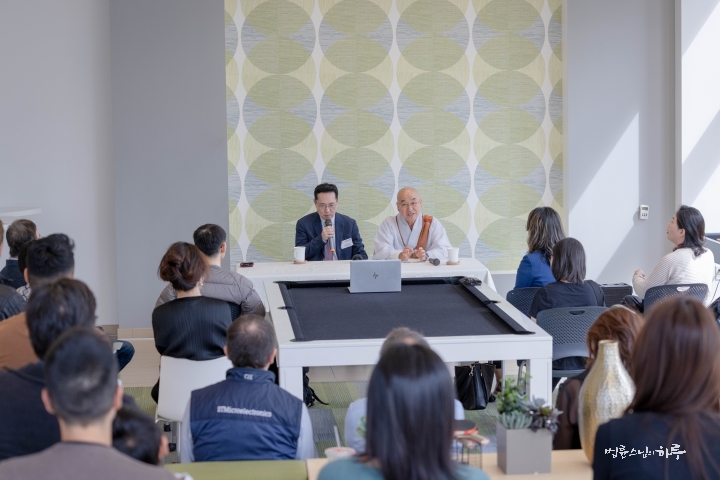
After receiving that counseling, he continued his career as a player for over ten more years. I also once counseled a famous baseball player whose name you’d recognize. He had a time when he was performing well in the major league but then dropped to the minor league. In the major league, he flew business class and was provided with a personal car, but in the minor league, he had to fly economy and take the bus. He said he couldn’t bear the loss of pride and wanted to quit. So I asked, ‘When did you start playing baseball?’ and he said he started in middle school. ‘Then, why did you do it?’ I asked, and he said he played because it was fun. Then I asked, ‘When you first joined a professional team, weren’t you happy to even get paid? And is the money you’re getting now more than when you first joined a professional team?’ He said he was getting ten times more. I pointed out that he was jumping for joy when he was getting just one-tenth of what he’s getting now, but now he’s looking miserable while getting ten times more, and advised him to play as if he’s having fun. After this counseling, he continued his baseball career for about another ten years.
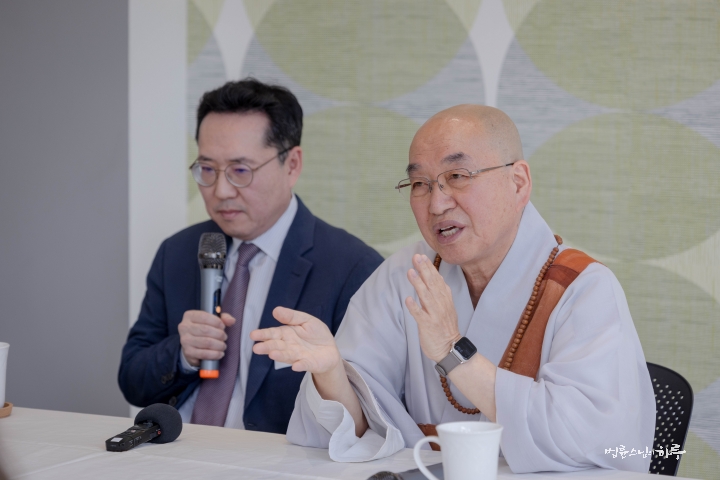
So you too can enjoy whatever work you do here. You get stressed when you lose because you’re attached to the idea that you must win. You need to break free from that obsession. Then you can live a little more freely than now. If things don’t work out well, you can quit. There’s no problem. You were living well before you joined this company, weren’t you?”
“Thank you.”
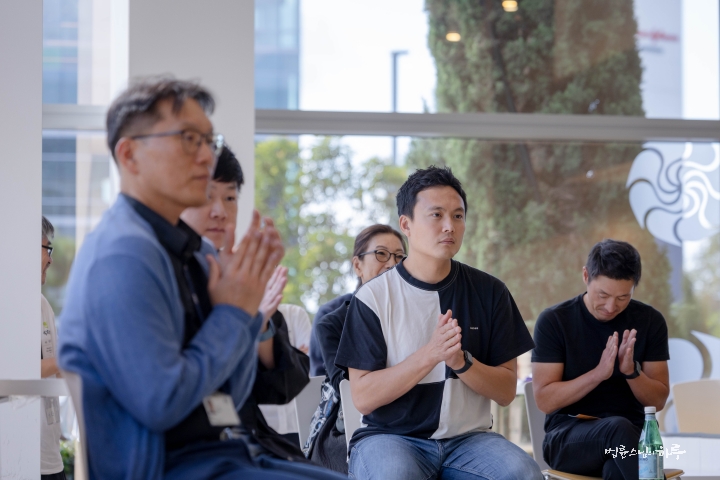
Questions continued to come in. As it was their first experience with Dharma Q&A, people asked more general questions about Buddhism rather than personal concerns.
Why do monks shave their heads?
Why does Buddhist enlightenment seem so difficult for ordinary people? I wonder if it can be understood easily like science.
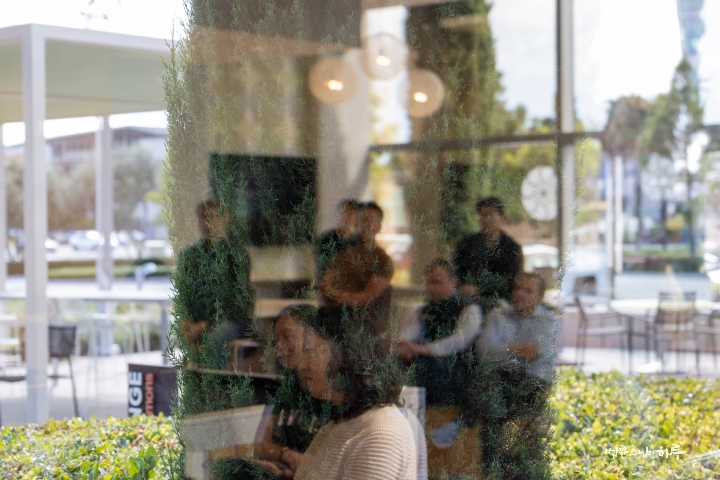
When the conversation ended, it was already 3:20 PM. He agreed to talk again if there’s another opportunity and concluded the lecture.
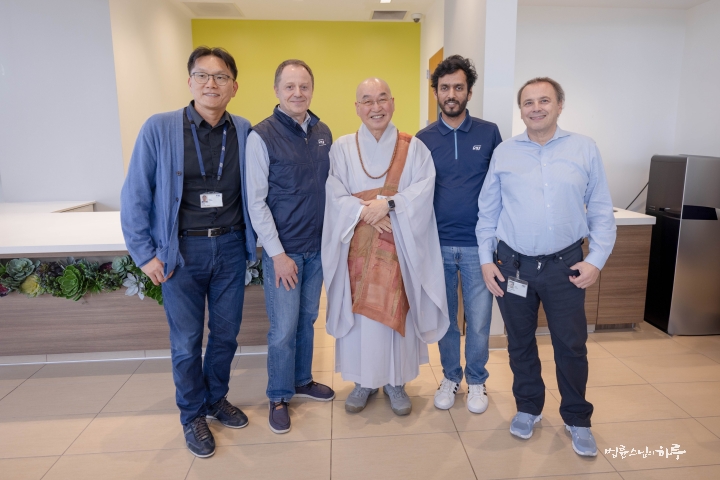
Sunim took a commemorative photo with the company employees and then returned to Ms. Kim Jun-ja’s house. After handling some work-related matters in contact with Korea and having dinner, at 6 PM, he moved to the lecture venue.

The venue for today’s third lecture of the North American West Coast tour is St. Thomas Episcopal Church located in Sunnyvale. This church, run by the Episcopal Church, has been lending its space whenever Sunim visits San Jose.

As Sunim arrived at the lecture hall, volunteers were warmly welcoming the attendees everywhere. Sunim also greeted the volunteers, shaking hands with them.
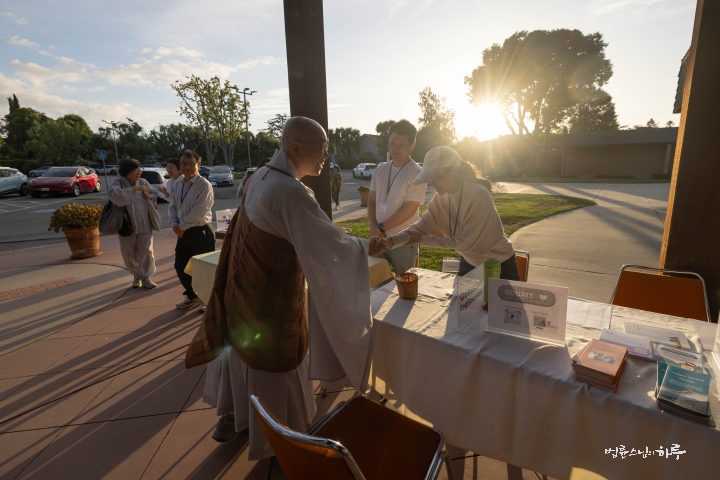
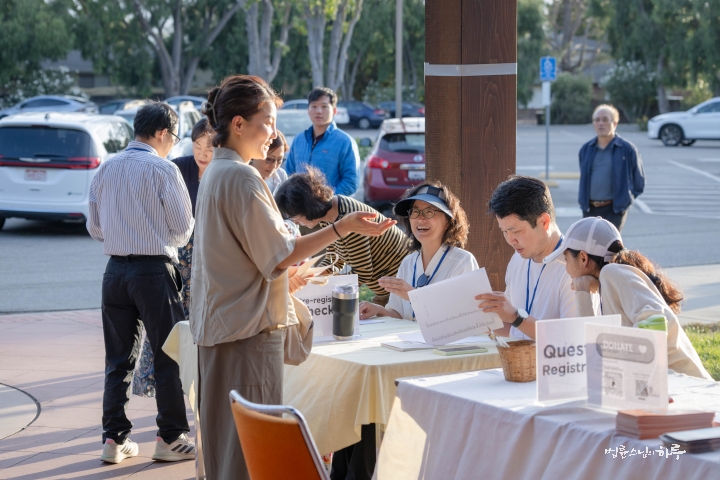
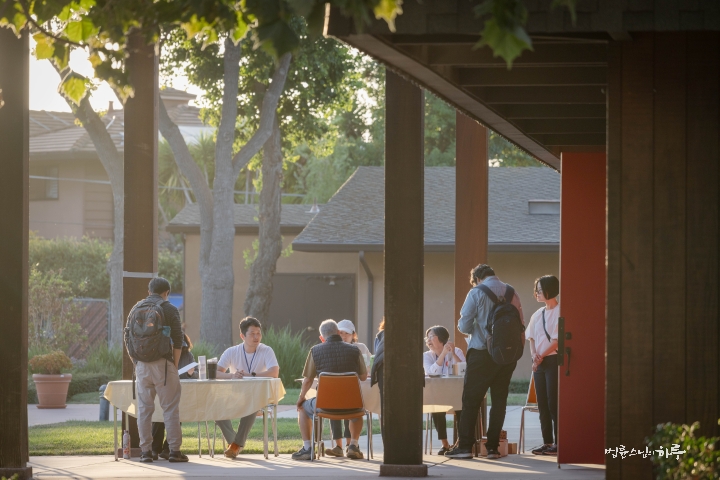
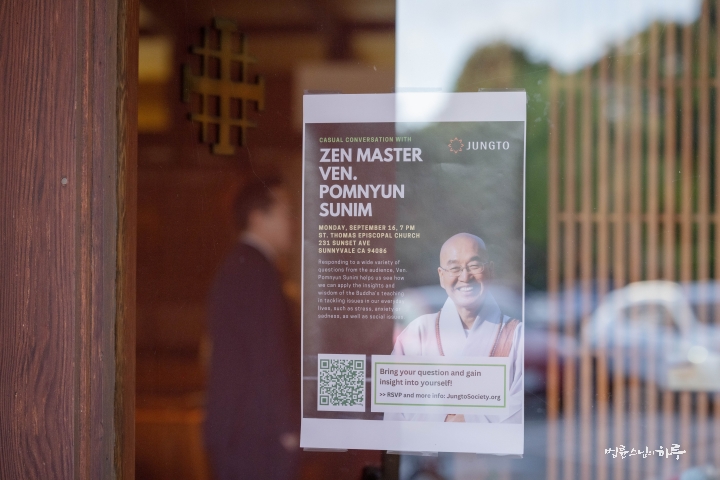
As the sun set and 7 PM arrived, Sunim walked onto the stage, and the audience welcomed him with a big round of applause. About 150 people attended, including local Americans.
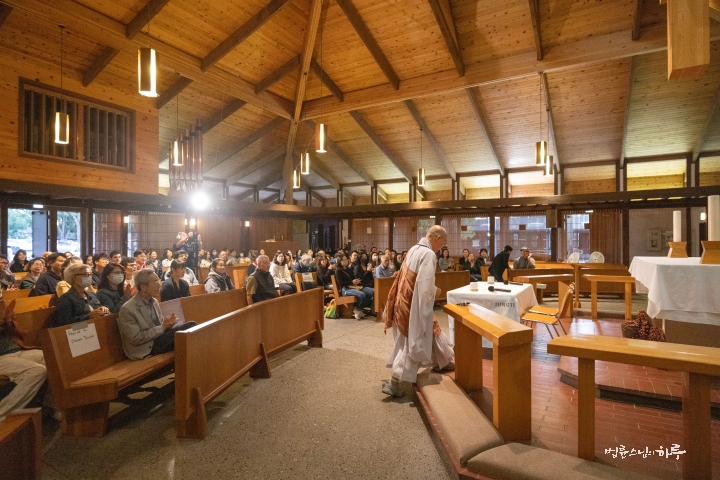
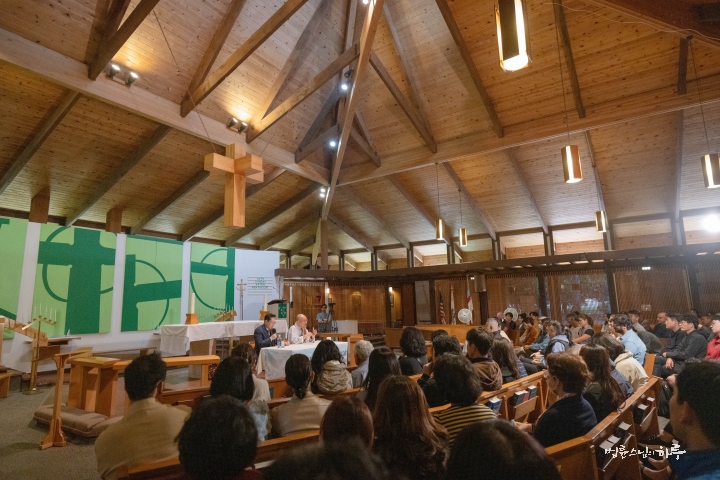
It’s been a year since the lecture at the Quinlan Community Center in Cupertino last September, which was attended by about 300 people. First, Sunim greeted everyone with a bright smile.
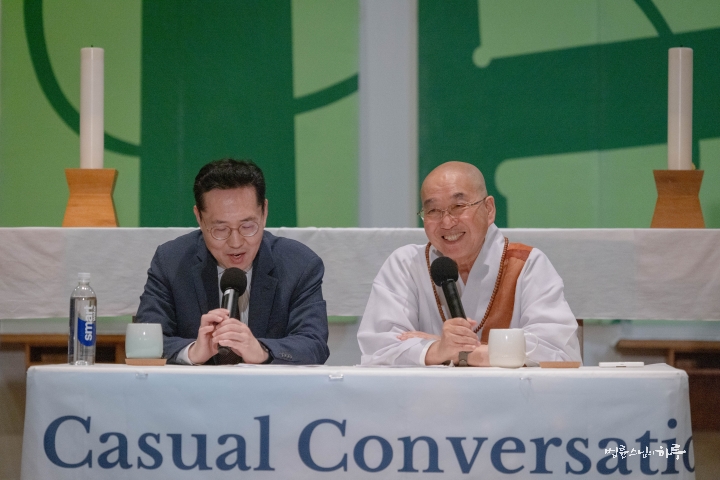
“If your questions are resolved or your suffering is somewhat alleviated through this conversation, today’s talk becomes a ‘Dharma talk.’ If the suffering is not resolved, it’s just a conversation. While the dialogue between the questioner and myself is important, I hope the audience will also listen attentively and participate together.”
Today, with Jason’s interpretation, ten people asked Sunim questions and had conversations. One of them sought Sunim’s advice on how to resolve conflicts with his wife, as they have very different standards of cleanliness and preferences for travel.
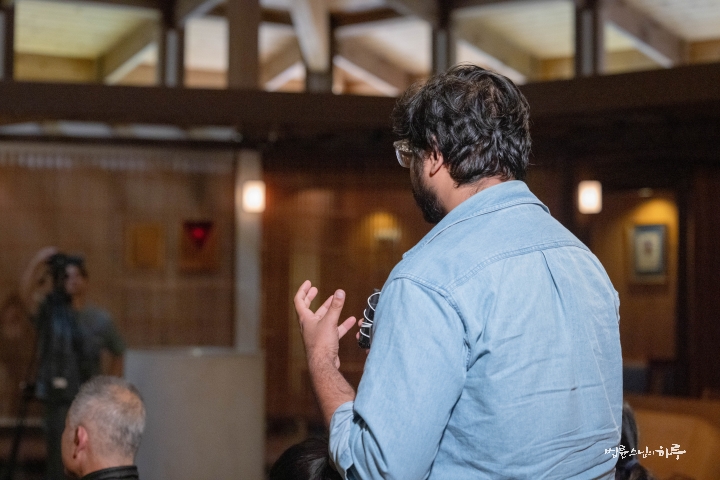
My wife and I have very different standards of cleanliness, which is difficult
“If you had married someone who doesn’t clean well, you might feel more comfortable, but wouldn’t your home be a bit messy? It’s not particularly good for children’s education either. It’s a good thing that your wife cleans thoroughly. You should be grateful that your wife is doing a good job of cleaning, which you might not do properly yourself. And since most of what your wife nags about is generally good, it’s wise to follow it. It’s best to follow the advice your friend gave: ‘Just do what your wife says.’
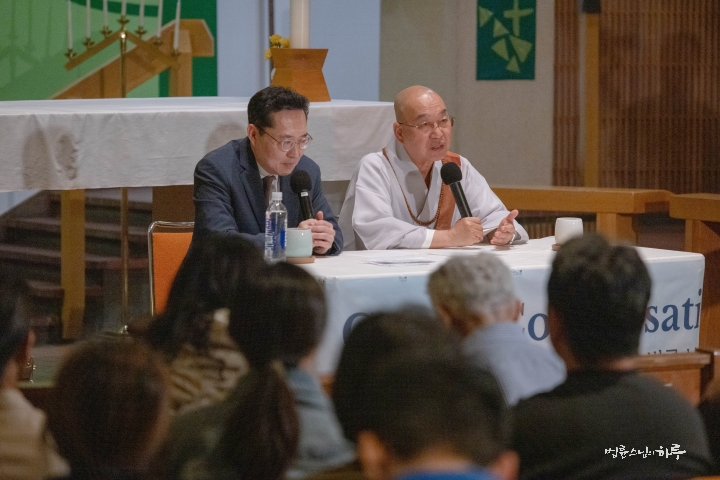
However, the problem is that you’re getting stressed from constantly listening to your wife. If you truly feel grateful that your wife is cleaning, you can simply say, ‘Thank you, honey!’ and benefit from her virtue. It’s best not to get stressed like that. But you have your own stubbornness. You’re getting stressed because there’s an underlying feeling of ‘Why do we have to do it exactly like that?’
If we compare living cleanly with being stressed, being stressed is worse. So to reduce your stress, you can choose not to follow your wife’s words. Instead, you’ll have to listen to a lot of nagging from your wife. You shouldn’t think, ‘Why is she nagging?’ You should accept that your wife has reasons to nag and say ‘I’m sorry.’ It’s good to follow your wife’s opinions as much as possible, but sometimes you can do what you want to do. You’re not your wife’s slave, so you can’t do everything according to her wishes. However, when you do things your way, make sure to say ‘I’m sorry’ first.”
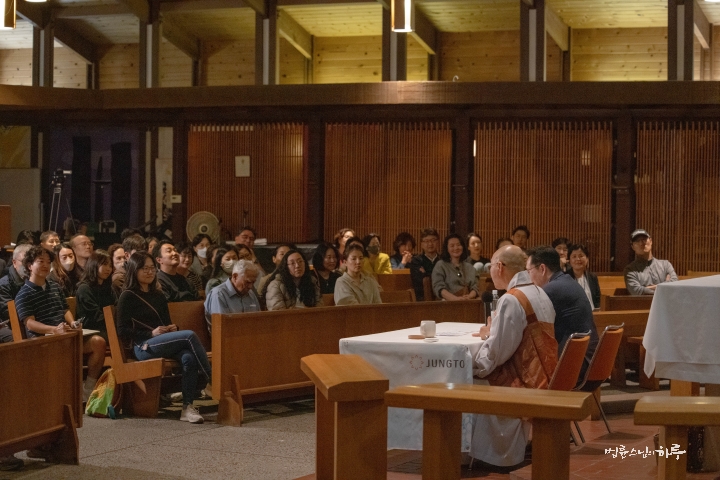
“For example, we have different opinions, such as how she really loves to go on vacations while I don’t. I prefer to stay home. I don’t think there’s a right or wrong in this situation, but how can we come to an agreement on this issue?”
“Wouldn’t it be better to go along with such things if you want to live with your wife? If that’s too difficult, you can get divorced. Divorce isn’t a difficult thing. You’ll break even with divorce because you were originally alone. Marriage is about adjusting to each other. When you get married, two different people live together in one house. Marriage isn’t ‘compatible people living together,’ but ‘different people meeting and adjusting to each other.’ If you have this perspective, married life becomes more comfortable.
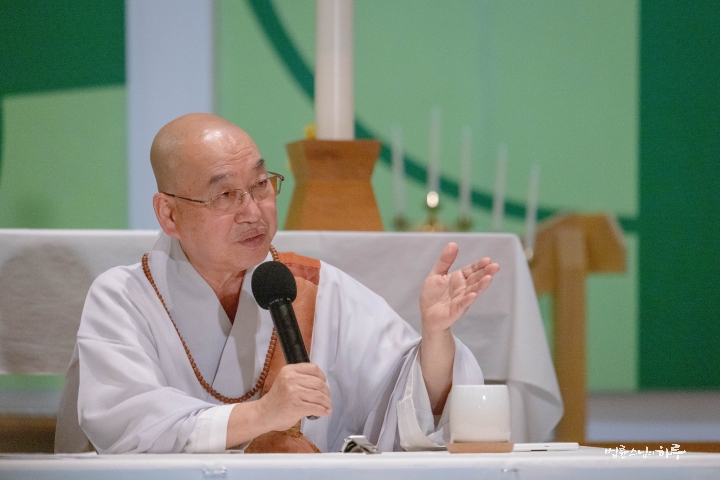
Let’s look at how human relationships are formed. We already think ‘they’ll be different from me’ about people we don’t know. But when we talk, we find out they’re Korean. Then we become a bit closer. As we talk more, we learn that we share the same religion, Christianity. We feel even more familiar. When we ask about hometowns, we find we’re from the same place. If our hobbies also match, the intimacy grows stronger. As we find more things in common, we gradually become closer. This can lead to becoming lovers or even marriage.
But it’s interesting how our brains work. As we discover one, then two, then more similarities with the other person, our brain jumps ahead. It concludes, ‘Ah, we’re the same in everything.’ That’s why we end up getting married. But when we live together, we start discovering differences one by one. As you mentioned, concepts about cleaning differ, and preferences for salty or bland food differ. As we keep discovering differences, how does our consciousness conclude? We say, ‘Our personalities are incompatible,’ ‘Our tastes are completely different,’ and we break up, saying we can’t live together.
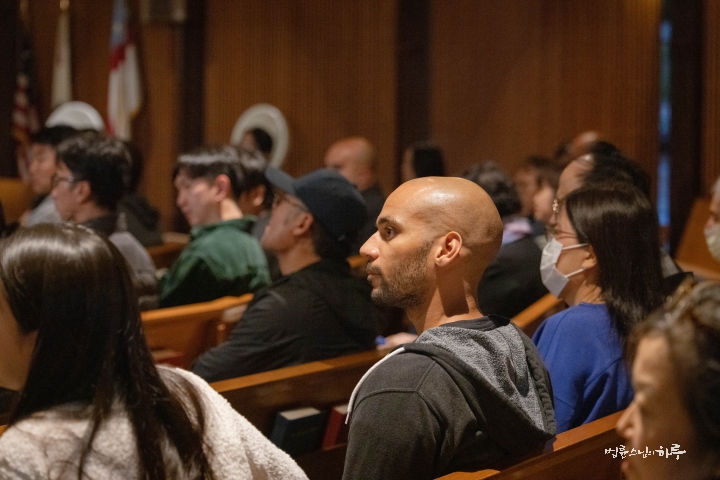
This is how meetings and partings occur. We meet because we discover similarities, and we part because we discover many more differences. We get married because we’ve found many similarities. That’s why after breaking up, when we meet someone new, we might think, ‘Oh, the previous person seems better.’
Whether you marry someone you’ve just met or someone you’ve dated for a long time, there’s actually not much difference in married life. Of course, people who’ve just met might have fewer things in common. However, because your brain hasn’t yet concluded that the two of you are the same, you keep discovering similarities as you live together. In other words, there’s no disappointment because expectations are low. But what happens when you marry someone you’ve examined for a long time? In a situation where expectations are that high, when you actually live together, anyone falls short of expectations. So disappointment grows. Whether it’s someone you met on the street or someone you’ve known for ten years, there’s not much difference when you live together. In the past, people even married those they first saw at the wedding ceremony, and the divorce rate wasn’t very high. But nowadays, even after matching all sorts of conditions and even living together before marriage, the divorce rate is high.
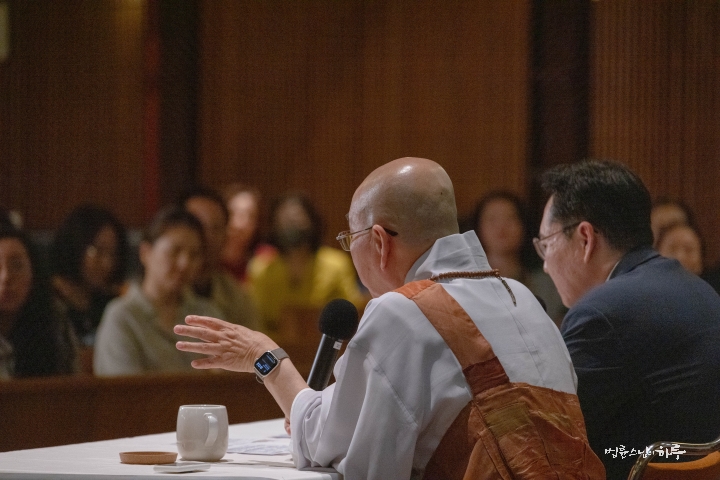
You need to adjust to each other on the premise that you’re different. What’s the easiest way to adjust? The easiest is for me to follow the other person. Because that’s something I can decide. Then what’s the most difficult? Making the other person adjust to me. Because there’s nothing I can decide there. Most of you abandon the easiest path and choose the most difficult one. Practice is about taking the easy path. But because you always choose the difficult path, it’s natural that you get stressed. Keep getting stressed.” (Laughter)
“Thank you”
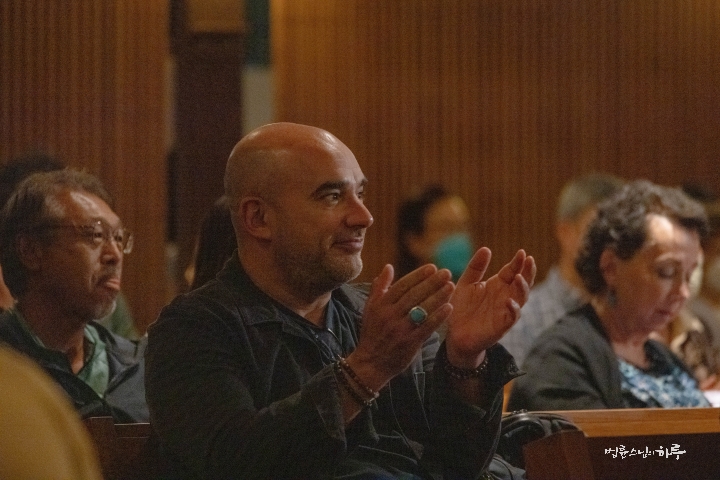
The questions continued.

I’m critical of progressive movements in Korea and around me. How should I view this?
I recently started a new business. How can I maintain smooth relationships with people I don’t know well?
I’m returning to Korea after 10 years of living in the U.S., and I’m very afraid. How should I manage my feelings?
I broke up after dating. People around me keep pressuring me to get married, but how can I get married?
My 16-year-old son, diagnosed with ADHD, doesn’t listen and often conflicts with people. How should I build a relationship with such a son?
I feel freer and more comfortable following my desires. Is it okay to live according to my desires even though it contradicts Buddhist teachings?
I’m confused about the difference between self-affirmation and arrogance.
I’m meditating, but it’s not going as well as before. How can I overcome this?
Why did you become a monk? What aspects of Buddhism did you like?
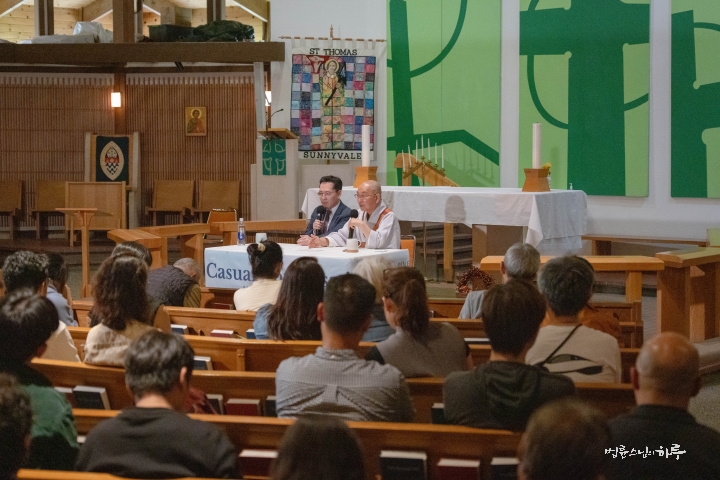
As we conversed, the promised two hours quickly passed. The lecture ended at 9:30 PM.
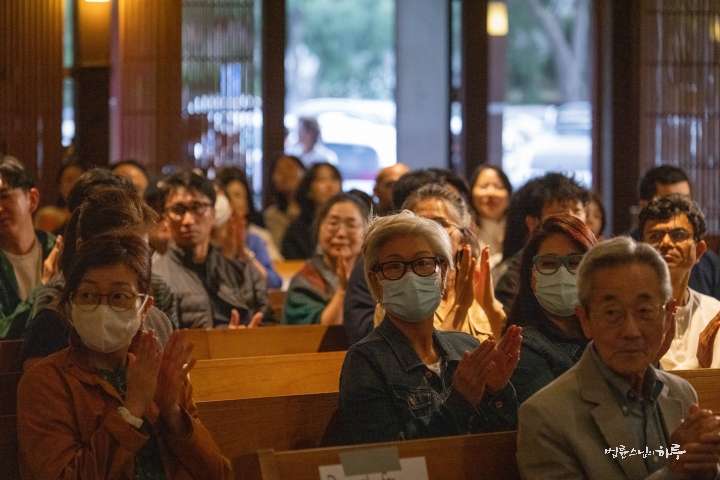
Sunim approached the attendees and questioners to shake hands.
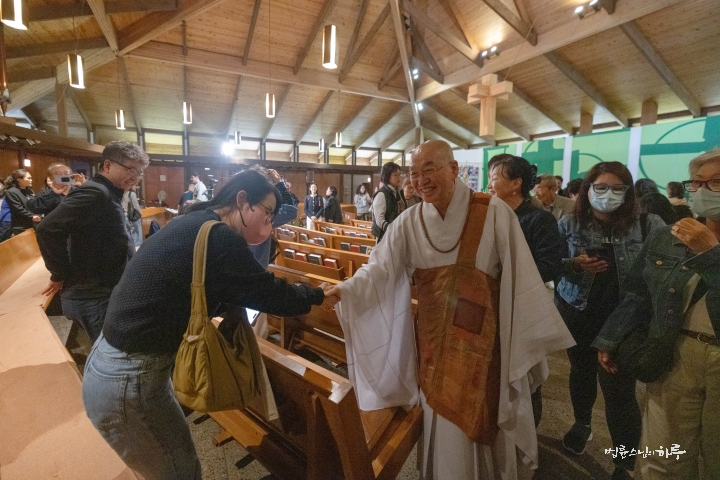
After all the audience left the lecture hall, Sunim took a commemorative photo with the volunteers who prepared the lecture.
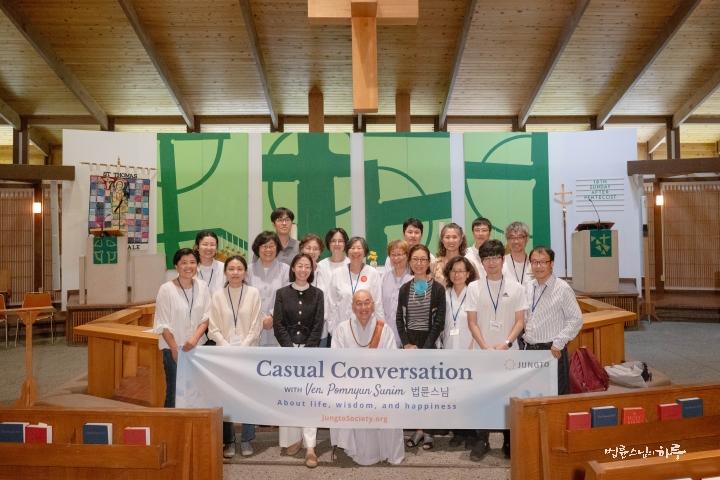
“San Jose!”
Sunim gifted his book to Ms. Lee Hyun-joo, who oversaw the lecture.
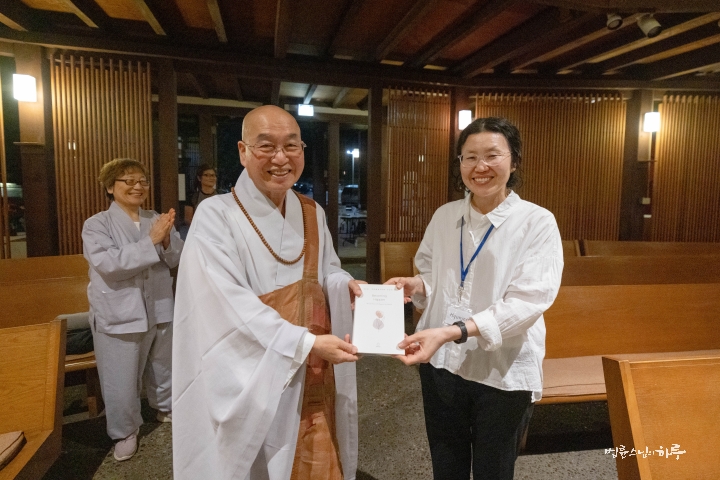
The volunteers cleaned up the lecture hall and shared their thoughts with Dharma teachers Myodeok and Bophae. Sunim thanked the volunteers and headed to his accommodation.

The full moon of Chuseok shone brightly in the night sky of San Jose, USA.

Tomorrow, Sunim will go to the airport at 4 AM, fly to LA, then drive a long distance to visit the LA Retreat Center. In the evening, Sunim will go to Orange County to broadcast the Weekly Dharma Meeting online.




